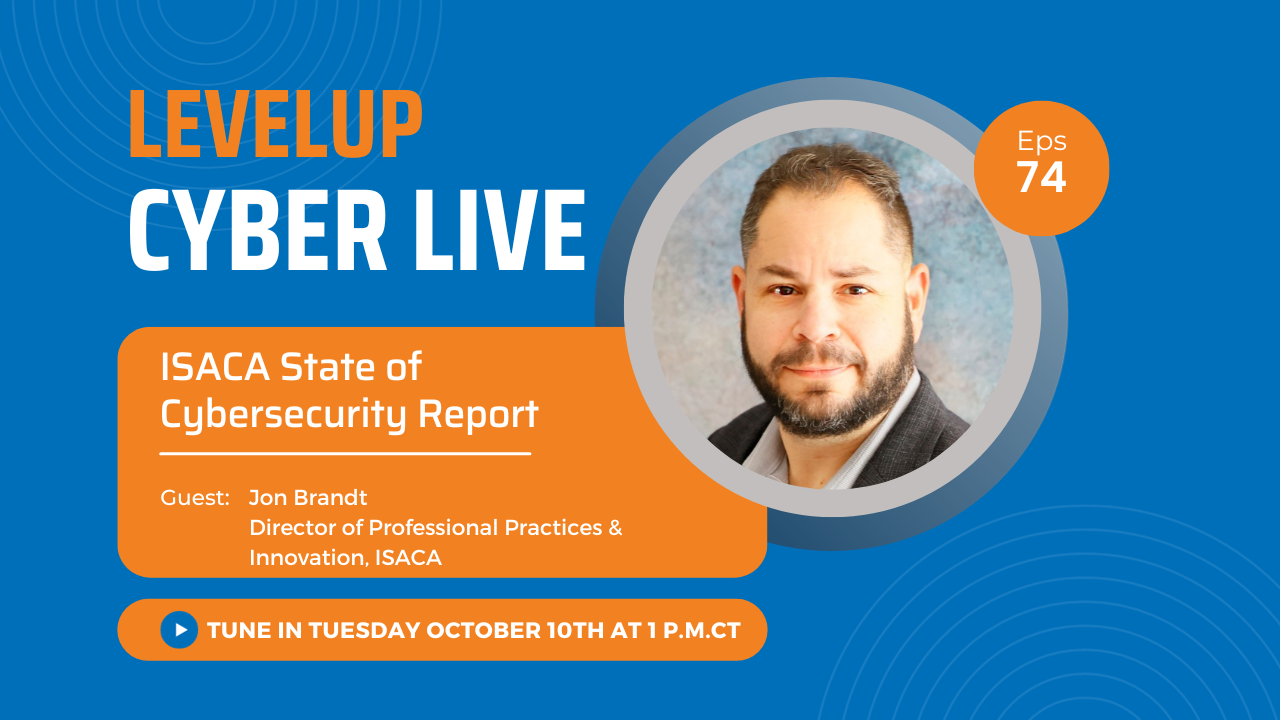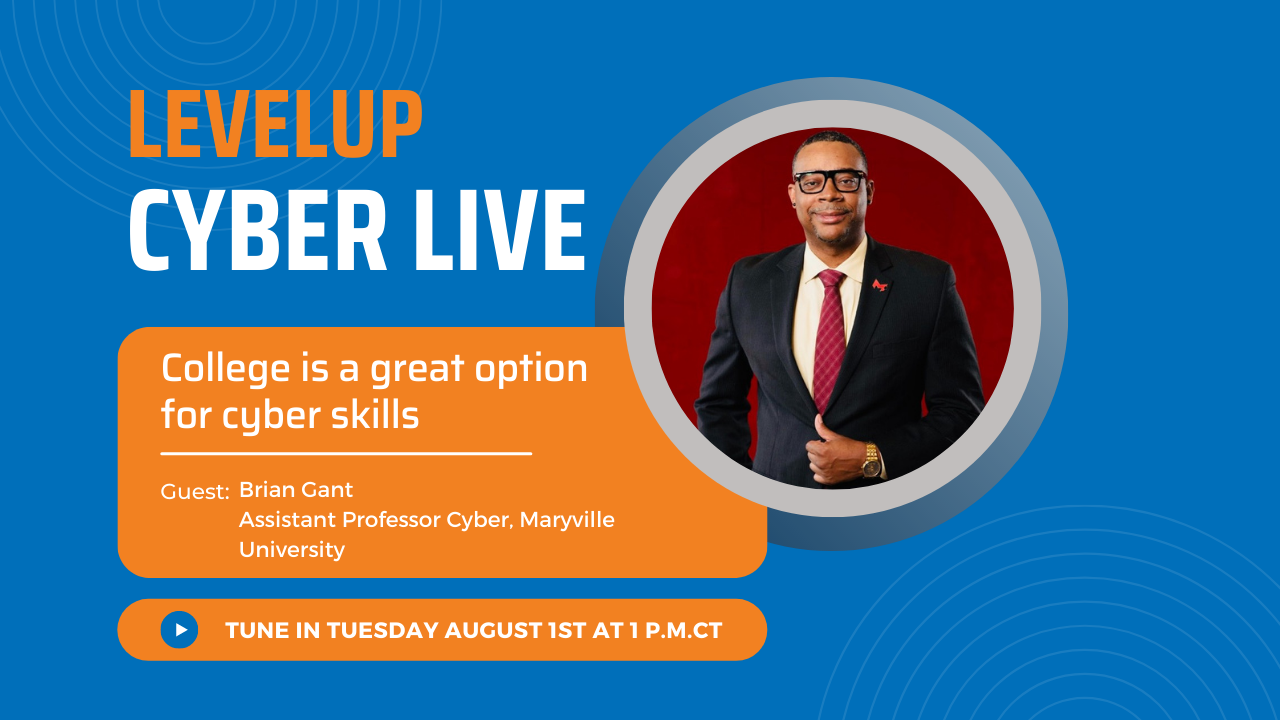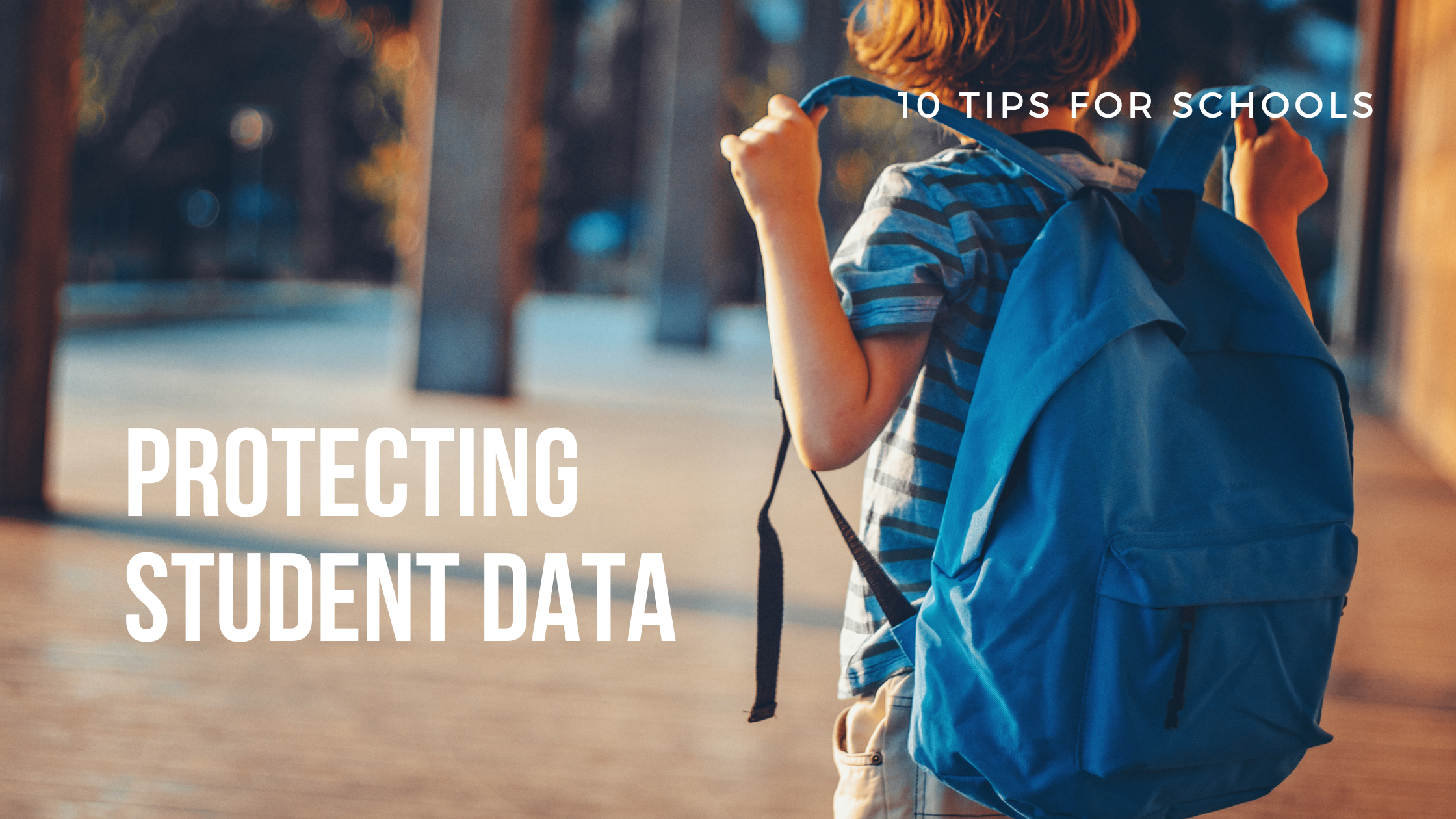
Cy Says Blog & Podcast
Posts about:
cybersecurity (6)


Ep 74: LevelUp Cyber w/Jon Brandt- ISACA State of Cybersecurity

Ep 73: LevelUp Cyber w/Tony Bryan - Build, Borrow, or Buy Talent

RGA Collaborates with CyberUp to Empower Youth Through Cybersecurity Program
St. Louis, MO, Aug 21, 2023 - RGA, a global leader in life and health reinsurance, proudly sponsors CyberUp’s Youth Program. CyberUp is a nonprofit organization whose mission is to elevate the cybersecurity workforce by igniting curiosity, developing talent, and transforming career pathways. This sponsorship and volunteer support seek to revolutionize the landscape of digital safety education by introducing PowerUp, an innovative youth program aimed at equipping elementary and middle school students with essential cybersecurity skills.
In an era marked by rapid technological advancements and the increase of digital platforms, the need for cybersecurity education has never been more critical. PowerUp, an initiative by CyberUp, is poised to address this pressing need. Designed as a comprehensive and engaging curriculum taught by industry volunteers, PowerUp ignites curiosity in young individuals and helps them navigate the online world confidently and securely.
PowerUp delivers a comprehensive curriculum that provides cybersecurity knowledge and skills to students. Participants will gain insights into fundamental concepts such as creating strong and resilient passwords, identifying and thwarting phishing scams, and adopting best practices for online safety. Furthermore, the program introduces students to the diverse and promising avenues within the cybersecurity industry, opening doors to potential career paths.
One of PowerUp's standout features is that it’s taught by IT/Cybersecurity industry professionals who bring real-world expertise and insights to the educational forefront. PowerUp removes the stress and burden off of the teachers so they don’t have to be the subject matter expert. Notably, the program is tailored to ensure inclusivity and accessibility, as it does not rely on sophisticated technology. This unique approach enables schools of varying resources to participate, thereby extending the program's reach to the students who need it the most.
"RGA is proud to support the PowerUp program to ensure youth in our community have equitable access and vast opportunities to pursue careers in the cybersecurity sector," said Jasmina Schue, ESG specialist, charitable giving at RGA. "Through our partnership with CyberUp, we hope to bring awareness about digital safety to the forefront and provide students with the knowledge and skills needed to navigate the digital world safely and securely."
For more information about RGA and its ongoing initiatives, please visit https://www.rgare.com/.
To learn more about PowerUp program and its transformative impact on youth cybersecurity education, please visit https://wecyberup.org/powerup/.
-1.png)
Ep 69: LevelUp Cyber w/Edgar Acosta - How to Build a Cybersecurity Practice
.png)
Ep 68: LevelUp Cyber w/Gerald Caussade - AI & Cybersecurity

Ep 67: LevelUp Cyber w/Brian Gant - College is Great for Skills
.png)
Transitioning into Cybersecurity - A Journey Resembling the First Day of School
Starting a career in cybersecurity is similar to the excitement and anticipation of starting a new school year. As students prepare for new academic challenges and experiences, aspiring cybersecurity professionals immerse themselves in the world of digital security and data protection. In this blog we will explore the parallels between transitioning to cybersecurity and starting school, highlighting steps needed to navigate this dynamic career and succeed in cyberspace.
1. A Scary First Day: Acquiring Basic Knowledge
When a student walks into a classroom on the first day of school, they encounter a realm of unfamiliar subjects. Similarly, entering the cybersecurity world can be overwhelming in terms of technical jargon, tools, and concepts. Embrace the initial jitters and focus on acquiring foundational knowledge. Enroll in cybersecurity classes, read industry blogs, and become familiar with cybersecurity frameworks.
2. Building Relationships: Networking in the Cyber Community
Just as school is an opportunity to make friends, getting into cybersecurity gives you the opportunity to network with industry professionals. Join cybersecurity forums, attend conferences, and connect with mentors who can guide you on your journey. Networking opens doors to new opportunities and valuable insights.
3. Problem-solving Skills: Embracing Challenges
School presents students with various challenges and encourages them to develop their problem-solving skills. Cybersecurity professionals face similar scenarios when dealing with constant threats. Embrace challenges with an inquisitive mind and determination to find solutions.
4. Learning from Mistakes: Embracing Continuous Improvement
Mistakes are a natural part of any learning process. In school, students learn from mistakes to improve their academic performance. Similarly, cybersecurity professionals must have a continuous improvement mindset that will help them investigate security breaches, understand root causes, and implement strategies to prevent future occurrences.
5. Teamwork and Cooperation: Playing Nice in the Sandbox
Group projects and teamwork take place in schools, teaching students the value of collaboration. In cybersecurity, collaboration between teams such as threat analysts, IT professionals, and management is critical to effectively defend against cyber threats. Learning to play nice in the Sandbox (pun intended) is a transferable skill that applies to everything.
6. Being Curious: Embracing Lifelong Learning
Successful students have a curiosity and a thirst for knowledge. It’s important to stay on top of the latest trends, threats, and technologies in cybersecurity. Engage in continuous learning, pursue certifications, and explore new aspects of cybersecurity to stay ahead in the field.
7. Graduation Day: Achieving Cybersecurity Milestones
Just as graduation is a milestone for students, cybersecurity professionals celebrate milestones as they advance in their careers. Whether earning certifications, leading security projects, or getting a promotion, every step is worth celebrating.
The transition to cybersecurity is similar to the excitement and challenges of starting a new school year. Embrace the journey with a thirst for knowledge, a commitment to collaboration, and a passion for problem-solving. As you navigate the cybersecurity field, remember that, like school, it’s a lifelong learning process. Embrace each challenge, learn from mistakes, and celebrate your achievements as you embark on a rewarding career in cybersecurity.

5 Tips for Keeping Kids Safe Online During the New School Year
As the new school year begins, parents play a vital role in ensuring their children's safety not only in the physical world but also in the vast digital landscape. With online learning, social interactions, and entertainment becoming more prevalent, it's crucial to equip parents with the knowledge to protect their kids while they navigate the virtual realm. In this blog, we'll share five essential tips for parents to keep their children safe online during the new school year.
1. Open Communication and Digital Literacy
Establish open communication with your children about their online activities and experiences. Encourage them to share any concerns or encounters that make them uncomfortable. Moreover, promote digital literacy by teaching them about online privacy, recognizing potential risks, and discerning trustworthy sources of information.
2. Set Clear Boundaries and Screen Time Rules
Create clear boundaries for internet usage and set age-appropriate screen time limits. Discuss guidelines for using social media, playing online games, and visiting websites. Striking a balance between digital interactions and real-world activities fosters healthier habits and reduces potential risks.
3. Implement Parental Control and Safety Tools
Leverage parental control and safety tools available on devices and applications your children use. These tools enable you to filter content, restrict access to certain websites, and monitor online activities. Familiarize yourself with the features and customize them to suit your child's age and needs.
4. Teach Online Stranger Danger
Educate your children about the concept of "online stranger danger." Advise them not to share personal information, such as their address, school name, or contact details, with strangers online. Encourage them to avoid accepting friend requests or messages from unknown individuals.
5. Be a Positive Online Role Model
Lead by example and be a positive online role model for your children. Demonstrate responsible internet usage, empathy, and respect in your own digital interactions. Emphasize that the same principles of good behavior apply online as they do in the real world.
As the new school year unfolds, parents must equip themselves with the tools and knowledge to protect their children's safety in the digital realm. By fostering open communication, promoting digital literacy, setting clear boundaries, implementing parental control tools, teaching online stranger danger, and being a positive online role model, parents can empower their kids to navigate the virtual landscape safely and responsibly. Together, let's ensure that our children's online experiences are enriching, positive, and secure as they continue their educational journey in the new school year.

Strengthening School Cybersecurity: Protecting Student Info
As we embrace a new school year, the safety and security of our students' information take on greater importance than ever before. With an increasing reliance on technology for education and administration, schools and teachers must prioritize cybersecurity practices to protect sensitive data from potential threats. In this blog, we'll explore proactive measures that schools can implement to keep their students' information safe and maintain a secure digital environment.
1. Conduct Cybersecurity Training for Staff
A robust cybersecurity practice starts with a well-informed staff. Organize regular training sessions for teachers and school staff to educate them about potential cyber threats, safe online practices, and how to recognize phishing attempts. This knowledge empowers staff to protect not only their own information but also that of their students.
2. Implement Strong Password Policies
Enforce strict password policies for all school-related accounts and systems. Require passwords to be unique, complex, and regularly updated. Utilize multi-factor authentication (MFA) whenever possible to add an extra layer of protection against unauthorized access.
3. Secure Data with Encryption
Ensure that all sensitive student information, including grades, medical records, and personal details, is encrypted. Encryption converts data into unreadable code, making it significantly harder for cybercriminals to access or decipher the information, even if they breach the system.
4. Regularly Update and Patch Software
Stay vigilant about updating software and applications on all devices used by the school. Regular updates often contain security patches that address vulnerabilities in the system, reducing the risk of exploitation by cyber attackers.
5. Back Up Data Frequently
Frequent data backups are crucial in the event of a cyber incident or hardware failure. Set up automated backups for all critical systems and ensure that the data is stored in a secure, off-site location.
6. Monitor Network Traffic
Employ robust network monitoring tools to keep an eye on incoming and outgoing traffic. Detecting unusual or suspicious activities promptly can help identify potential cyber threats and mitigate them before they escalate.
7. Restrict Access to Sensitive Information
Limit access to student information on a need-to-know basis. Only authorized personnel should have access to sensitive data, and their permissions should be regularly reviewed and updated as necessary.
8. Secure Remote Learning Environments
If the school supports remote learning, ensure that the virtual classroom platforms and collaboration tools used are secure and privacy-compliant. Train teachers and students on best practices for online safety during remote sessions.
9. Develop an Incident Response Plan
Prepare an incident response plan that outlines the steps to be taken in case of a cybersecurity breach. A well-structured plan can help minimize damage and speed up the recovery process.
10. Foster a Cybersecurity Culture
Promote a cybersecurity-conscious culture within the school community. Encourage students, teachers, and parents to report any suspicious activities promptly. Emphasize that cybersecurity is a shared responsibility.
As schools embrace the digital age, safeguarding student information must be a top priority. By implementing cybersecurity practices, such as conducting regular training, enforcing strong passwords, encrypting data, and developing incident response plans, educational institutions can significantly reduce the risk of cyber threats. By fostering a culture of cybersecurity awareness, schools can create a safe and secure digital environment for their students and staff, enabling them to focus on the joy of learning and teaching without compromising their privacy or safety. Let this school year mark a new chapter in strengthening our commitment to safeguarding our educational community's digital well-being.
